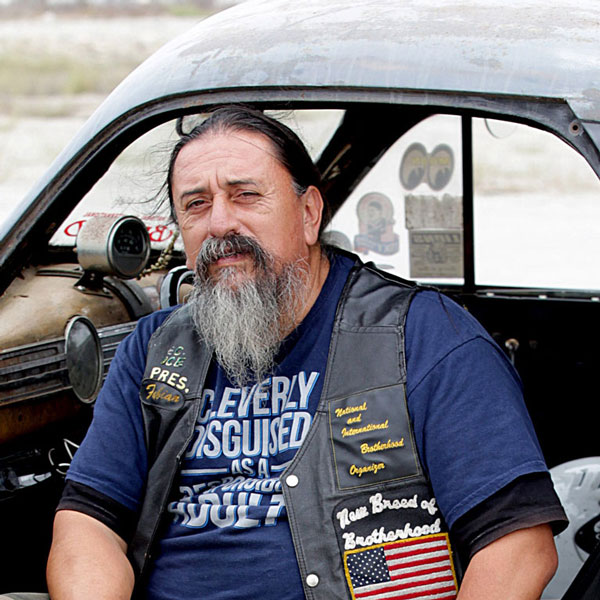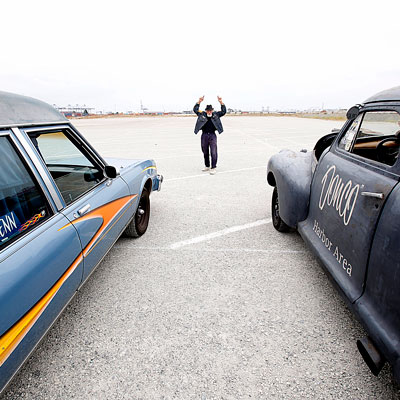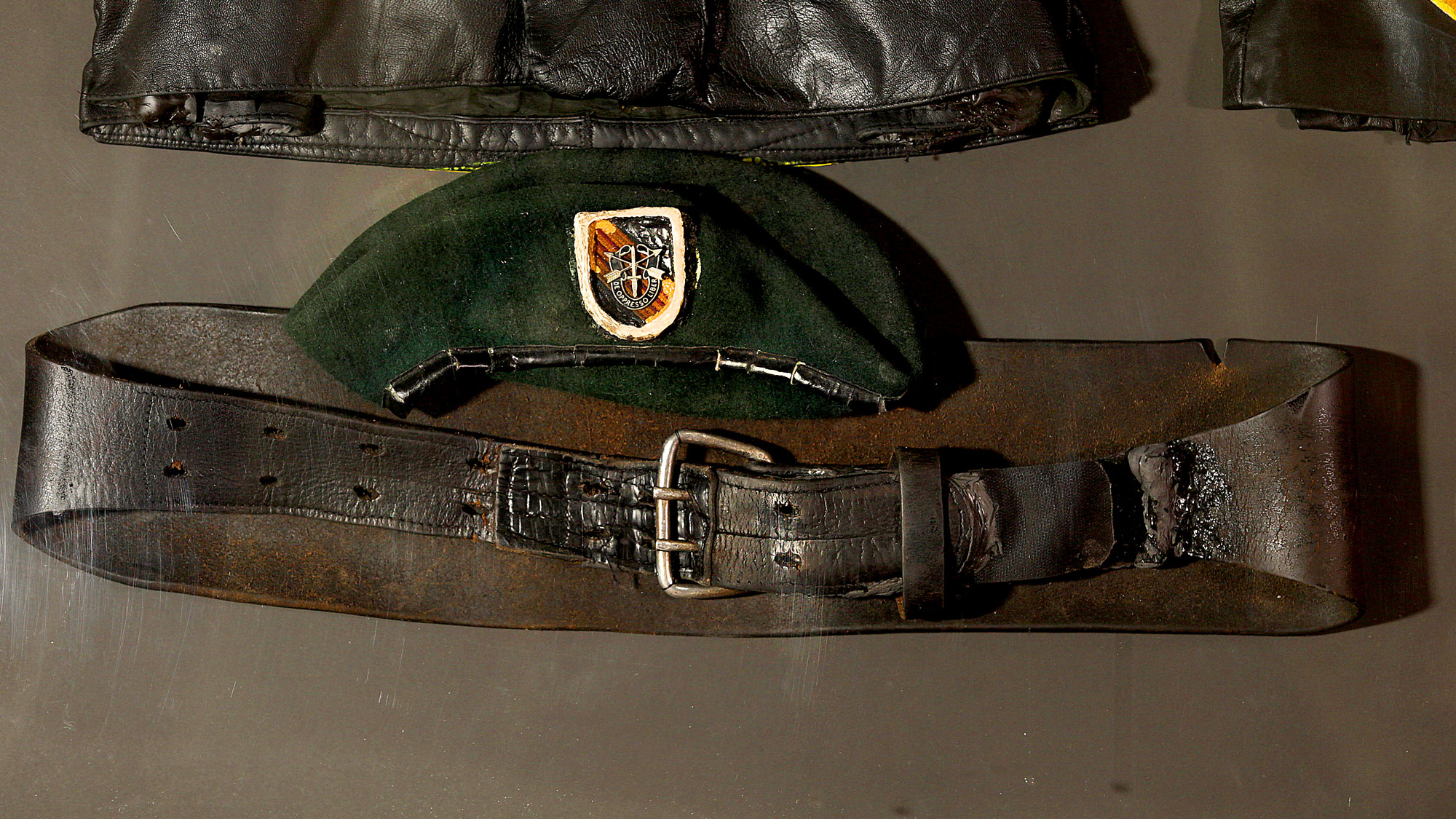Listen now
Subscribe to the podcast
A startling revelation about Big Willie Robinson led to a reappraisal of the street racer and his mission. As members of the Brotherhood of Street Racers tried to make sense of his secret, a new truth emerged.
See more

The persona
Big Willie's military service — he said he was drafted in 1964 and fought in the Vietnam War — was key to his relationships with the power brokers in L.A., especially at the Los Angeles Police Department. Historian James Bultema, a former member of the LAPD who joined after his own service in Vietnam, said that experience would have endeared Willie to people on the force, which backed the street racers. "Back then, when I went through the academy in 1970, I bet you 60-70% of the class were all veterans," Bultema said. "So ... that background, like I said, would have won him over to a lot of cops."
Stories of valor
Tales of Willie’s heroics in Vietnam are well known among friends, family and members of the Brotherhood. Willie was a bomb disposal technician. Willie jumped out of airplanes. Willie ate snakes to survive. It seemed like maybe the stories had taken on a life of their own in the hands of people who wanted Willie to be larger than life. One bit of lore involved him being saved by a fellow soldier after getting wounded — an incident that supposedly ended Willie’s military service in 1966. Several obituaries for Willie mentioned his work as a member of the U.S. Army Special Forces. So did the program from the memorial service following his death in 2012.

The uniform
Big Willie's uniform included fatigues and other military garb. It was a huge part of his identity. And Vietnam was part of his metamorphosis into Big Willie, leader of the Brotherhood. Here's what his sister Jean Davis-Hatcher said: "He went more from a Malcolm X kind of mentality to a Martin Luther King kind of mentality. And I think it had a lot to do with going to Vietnam."

In his own words
Big Willie told stories about his exploits in Vietnam as a member of the Army Special Forces. He said his covert work with the Green Berets during the war involved secret missions with the CIA.
Deception
None of it was true. The Army’s records, provided to The Times through a Freedom of Information Act request, show that Willie never completed basic training and was honorably discharged in 1966 due to a preexisting medical issue. There is no record of Willie being deployed to Vietnam and serving in the Army Special Forces there. The story Willie told that impressed politicians and police — it’s a lie.

Understanding the documents
The Times consulted five experts, including a military historian and a veteran, to help parse Willie’s 23-page Army file. Among them was a representative of the Guardians of the Green Beret, a group of former and current Army Special Forces soldiers that exposes military fraudsters and also honors real heroes. "There is nothing better than somebody sending us a name, and us responding back saying, 'He's legit,'" said a member of the organization, who requested anonymity due to the sensitive nature of its work. "On our website we honor true Special Forces heroes. It would be so much nicer if every time we put something on our website it was another Special Forces hero instead of another fraud." The Guardians group provided expertise during the reporting process to help make sense of the military documents and Willie's claims. Big Willie always said he began his service in 1964, but the records show he was inducted in 1966. The papers indicate there were immediate signs his physical condition would be an issue. His induction record lists “back and feet trouble” in a box where “physical defects” are to be noted. Less than a month into basic training at Ft. Bliss in Texas, his health was reevaluated and he got the lowest possible scores for his overall physical capacity and his legs.

READ MORE
‘Unfit for retention’
Kevin Walton, a former Air Force communications analyst, was among those who reviewed Willie's files. Walton said "the scores that he got on his physical tests — that was most likely a disqualifying factor." Within days of the test, Willie wrote a letter to the commanding general at the Army hospital in El Paso, requesting a discharge for “physical disability.” Willie said he’d been notified that he was considered “unfit for retention in the military service.” A few weeks later, Willie's request was approved by the Army.

Further proof
Archivist Steve Sherman, who maintains a databank on Special Forces activities during the Vietnam War, said that the work of Green Berets is documented in their Army files, and he has no mention of Willie in his archives. Others said Willie's file shows he couldn't cut it as a Green Beret. "He didn’t have the training necessary," Walton said. "His job code never progressed beyond basic trainee. And some of the physical conditions that they labeled on his testing made him unfit for service."

In his own words
Willie presented himself as a hero — but he never even left the States. He received an honorable discharge two months after he reported to Ft. Bliss. Years after returning from his military service, Willie talked about his guilt over surviving the Vietnam War. Knowing the truth about his time in the Army, that guilt took on a new dimension.
Making sense of it
Military service is sacred in America. There’s actually a law prohibiting pretenders from falsely asserting they’ve served their country — the Stolen Valor Act of 2013. Mary Schantag, who runs POW Network, another organization that brings military fraudsters' lies to light, said that Willie will always be "somebody that used a false narrative to get wherever he went in life. The fact that he spent his days in fatigues, and he spent his days telling a Vietnam story that cannot be authenticated — to me, it just crushes those that earned that." Other people with connections to the military saw things differently. Walton, who served in the Air Force for six years, acknowledged how tough it is to reconcile Willie’s lies with the man he made himself out to be. But he ultimately focused on the good that Willie did. "I think that his legacy of healing racial tensions is something that people should look back on fondly and they should try to carry that forward," Walton said.

The Brotherhood learns
Telling members of the Brotherhood about Willie's lie wasn't easy. They'd welcomed L.A. Times journalists to their gatherings at a South Central Avenue clubhouse, where they served barbecue, swapped stories about Big Willie — and talked trash about the races to come. Learning of this lie might devastate them. Imagine for a second that you had a friend who was always there for you. He was charismatic and kind. Supportive. When you were at a low point in your life, he helped you get back on your feet. Then, years later, you find out his life story involved a lie. How would you feel? The representative of Guardians of the Green Beret shared some perspective on the difficult nature of conversations with people close to those who have been untruthful about their service: "You try to be as non-emotional and maybe as vanilla as possible. You tell them, 'Don't hate the messenger.' You look at the claims, and all you do is provide the truth. It needs to be done."

Shock to acceptance
Several Brotherhood members were shocked. But acceptance came quickly. “It doesn't change the man,” said Fabian Arroyo. “So he has faults. We all do. I got faults." Arroyo believes that Willie would have been devastated over his inability to serve — and that the lie helped him get through a rough time. He said Willie "felt guilty he didn't fight. Because the survivor’s guilt he had was real. He had that guilt and it was deep. You could just feel it."

What really mattered
Longtime Brotherhood member Harlan Brown said he had been a draft dodger and that Willie’s lie didn’t matter to him. Brown said that what mattered was the good that Willie had done on the streets of L.A. — not what he did or didn’t do during the Vietnam War.


Experiencing the uprising?
If Willie wasn't in Vietnam and actually witnessed the Watts riots, it could explain why he so steadfastly pursued his mission of peace. This isn’t just idle speculation — Pat Holmes, a friend of former Times Publisher Otis Chandler — recalled the street racer and the mogul meeting during the riots. Before long, Chandler became Willie's benefactor. "Otis drove down there in his Porsche and stopped at the police barricade and basically said, 'I'm going through.' They warned him. He risked his life by going downtown during the riots to talk to the leaders," Holmes said. "I think that’s where he met Big Willie."
More evidence
In one newspaper story, Willie shared a different version of his whereabouts during this era — focusing on the Watts riots rather than Vietnam. In a 1972 Miami Times article, he talked about what he experienced during the uprising. “I saw the whole mess,” Willie said. “It was a fight between the blacks and the police. You had to drive with your inside lights on so people could see you were black. In Watts then, a white was risking his life. There were roadblocks everywhere. If you goofed up at a roadblock, you could get your head blown off. I saw two innocent people killed.”

His family
The Times attempted to discuss Willie's military record with his family. Reached by telephone, his brother Don Ray Robinson said he was unaware of Willie's lie and declined further comment. Willie's sister Jean Davis-Hatcher did not directly respond to an email laying out the findings, but said in one message: “There is nothing you could say or write that would impact our memories of Big Willie.”
Powerful perspective
Former L.A. City Councilman Robert Farrell provided some perspective on what it was like to be a black man trying to change a city with deep-seated problems after the deadly Watts riots of 1965. Both Farrell and former Mayor Tom Bradley were major benefactors of Willie's. Farrell said that he wasn't aware of Willie's lie, but he said: "Willie was in the military; it was during the Vietnam era. And for me, at that particular time, that was enough. He was doing things that were positive in the community at that time." Farrell was speaking from experience when he said that it would’ve been incredibly tough for Willie as a black public figure. "It was rough. There were moments when law enforcement was not that nice in looking at us or thinking about us. Please remember the context of the streets of Los Angeles when Willie was out there and active."


Context is key
The context is important. Think about what Willie faced after the Watts riots. He wants to make a difference. And he’s a black man from New Orleans without a college degree. He’s been promoting street races in South L.A. And he has a vision of how he can use cars to bring people together. But the cops and politicians he needs to help him were on the watch a year earlier when South L.A. erupted. So he lies to create a version of himself that's palatable to people whose support he desperately needs. And then, over the years, he gets better and better at conjuring this character. He creates a new version of himself — one that all sorts of people can embrace.
A greater understanding
In the end, how you feel about Willie's lie is probably tangled up in how you feel about so many other things. You may be angry and find him irredeemable. You may be compassionate and note the lives he truly changed. Lives like that of Lloyd Gavin, a childhood friend. Gavin, who attended high school with Willie in New Orleans, recalled that as a teenager, Willie told him he’d one day join the Army’s “special ops.” As a young black man coming of age in the segregated South, Gavin was inspired by Willie’s dreams, and went on to become a university professor. "I would look at the sum total of what he has done," Gavin said. "What is the sum total? There are people who are hobbling and couldn't make it through society. He gave me something and I developed a backbone and I learned to walk. A person like that is a prophet. He may not be a perfect prophet. But they have done something that most people will never take time to do, and that is they help another person."


Next episode
Shut Down »
Subscribe to the Play Next newsletter to be the first to know when we release new episodes.
Website credits
Reported by Daniel Miller. Digital production by Sean Greene. Edited by Kimi Yoshino. Video production by Myung Chun, Robert Meeks, Jason Neubert and J.R. Lizarraga. Copy edited by Rubaina Azhar. Photography by Myung Chun, Kirk McKoy, Howard Koby and Steve Reyes. Photos edited by Mary Cooney. Research by Scott Wilson. Audience engagement by Tessa Bangs. Additional production by Jessica Perez.
Podcast credits
Reported, written and hosted by Daniel Miller. Produced by Grant Irving. Edited by Catherine Saint Louis. Story supervision by Kimi Yoshino. Executive produced by Jonathan Hirsch. Additional production by Karan Nevatia. Sound design and mixing by Daniel Tureck. Music by Nolan Schneider and Grant Irving. Sound engineering by Mike Heflin. Research by Scott Wilson. Fact checking by Laura Bullard. Copy edited by Rubaina Azhar. Additional audio work by Myung Chun, Jason Neubert and Robert Meeks. Audio rights and clearance by Alan Hagman, Paige Hymson and Erica Varela. Legal work by Jeffrey Glasser. "Larger Than Life" is a production of LA Times Studios with support from Neon Hum Media.

 Apple Podcasts
Apple Podcasts Spotify
Spotify Stitcher
Stitcher